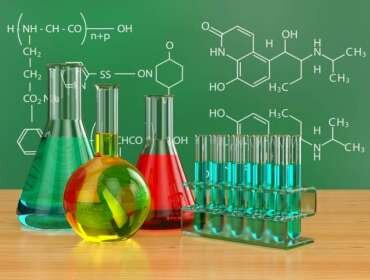Everyone liked to observe the reaction of reagents. But few know interesting facts about chemistry, which we will discuss in this article.
- Modern passenger aircraft use from 50 to 75 tons of oxygen during a nine-hour flight. The same amount of this substance is produced by 25,000-50000 hectares of forest in the process of photosynthesis.
- One liter of sea water contains 25 grams of salt.
- Hydrogen atoms are so small that if they are placed in a chain one after another in the amount of 100 million, the length will be only one centimeter.
- In one ton of the water of the World Ocean, 7 milligrams of gold is contained. The total amount of this precious metal in water of the oceans is 10 billion tons.
- In the human body, there is approximately 65-75% of water. It is used by systems of organs for transporting nutrients, regulating temperature and dissolving nutrient compounds.
- Interesting facts about chemistry relate to our planet Earth. For example, over the last 5 centuries, its mass has increased by a whole billion tons. Such a weight was added by cosmic substances.
- The walls of the soap bubble are perhaps the most delicate matter that a person can see with the naked eye. For example, the thickness of cigarette paper or hair is several thousand times thicker.
- The bursting speed of the soap bubble is 0.001 seconds. The rate of the nuclear reaction is 0.000,000,000,000,000,000 001 second.
- Iron, a very hard and durable material in its ordinary state, becomes gaseous at a temperature of 5,000 degrees Celsius.
- In just a minute, the Sun generates more energy than our planet spends for a whole year. But we do not use it completely. 19% of the solar energy absorbs the atmosphere, 34% returns to space, and only 47% reaches the Earth.
- Strangely enough, but better than by the air sound is carried by granite. So, if there was a granite wall (solid) between people, they would hear sounds at a distance of one kilometer. In ordinary life in such conditions, the sound spreads only for a hundred meters.
- Swedish scientist Carl Scheele is the record holder for the number of open chemical elements. He discovered chlorine, fluorine, barium, tungsten, oxygen, manganese, molybdenum.
The second place is shared by the Swedes Jacob Berzelius, Carl Mosander, the Englishman Humphry Davy and the Frenchman Paul Emile Lecoq de Boisbaudran. They own a quarter of all known elements of modern science (that is, 4 each). - The largest platinum nugget is the so-called "Ural giant". Its weight is 7 kilograms and 860.5 grams. This giant is kept in the Diamond Fund of the Moscow Kremlin.
- On 16 September 1994, the International Day for the Protection of the Ozone Layer was held, in accordance with the decree of the United Nations General Assembly.
- Carbon dioxide, which is widely used to create modern carbonated beverages, was discovered by the English scientist Joseph Priestley back in 1767. Then Priestley was interested in the bubbles formed during the fermentation of beer.
- Dancing squid – is so called an amazing dish in Japan. A recently caught and killed squid is put in a bowl of rice and sipped with a soy sauce in front of the customer. When interacting with sodium, which is contained in soy sauce, the nerve endings of even the killed squid begin to react. As a result of this chemical reaction, the mollusk begins to "dance" directly in the dish.
- Skatole is an organic compound that is responsible for the characteristic smell of feces. It is interesting that in low concentration this substance has a pleasant floral flavor, which is used in the food industry and perfumery.


